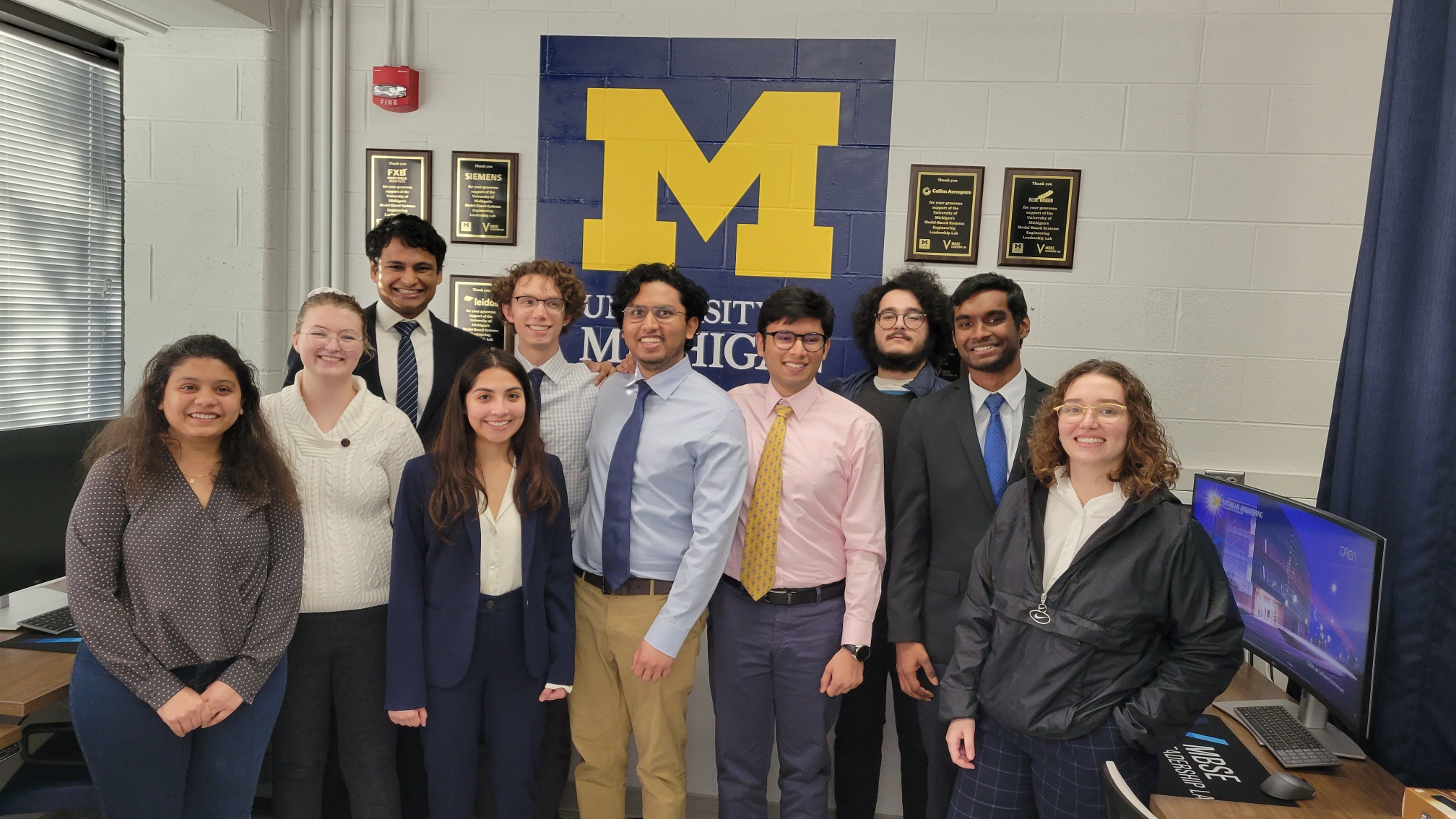
U-M student team is a finalist in NASA design competition
RASC-AL team develops sample collection system in innovation in space competition

RASC-AL team develops sample collection system in innovation in space competition
A University of Michigan Aerospace Engineering student team has been selected as a finalist in NASA’s 2022 Revolutionary Aerospace Systems Concepts – Academic Linkage (RASC-AL) Competition, taking place at Kennedy Space Center in June. The U-M RASC-AL team will join 14 other teams from 10 universities to compete in one of four themes to develop new concepts leveraging innovation to improve our ability to operate in space.
The U-M team’s concept, titled “LuVESS: Lunar Vacuum-Enabled Sample Solution,” creates a universal sample containment system, allowing astronauts to collect, store and maintain samples from -230C to +4C in a unit weighing less than 100 kg.
“This project has been a whirlwind learning experience in systems engineering thinking, and a fantastic opportunity to see what it’s actually like to put together a space-bound system from the ground up.” comments Christopher Clyne, RASC-AL’s team lead.
The U-M RASC-AL team created their own set of requirements that helped them develop a briefcase design format with three separate compartments each to withstand three different temperature ranges. The compartments use different cooling methods and the entire system is insulated by a vacuum, mirroring the environment in space. The team included an additional detachable section to capture biological samples, managed by thermoelectric sensors.
The U-M RASC-AL team is one of four teams in Professor George Halow’s Systems Engineering 495 course in the Aerospace department. In the course, teams work on a particular design, build, fly project using industry proven tools and technologies in systems integration and engineering, with a specific focus on Model-Based Systems Engineering (MBSE).
“I am beyond delighted to see this team’s progression over the last several months. This is the first time for a Michigan Aerospace Engineering-centered team to be a finalist in this competition. They have been through several cataclysmic events – including both scope and leadership changes – which routinely sink any project team, and they still flourished. We sat down in late January, fundamentally rethinking the approach to the project and the team process, and the leadership and maturity they showed in response was nothing short of “role model.” The lessons they have learned, and the resilience they have demonstrated, will help propel them to future career success.
RASC-AL’s development has been a group effort. A variety of faculty members have been key mentors and instructors, from Halow to Steve Battel to Jonathan Van Noord. Additionally, the team has been able to benefit from superb industry mentorship and coaching through the gateway design review process, so fundamental to the AEROSP 495 course, and which will be carried forward into future versions of the course.
Karen Albrecht (BSE ‘72), retired Lockheed Martin executive, career/personal development coach and motivational speaker, is an Industry Advisory Board member in the Aerospace Department and has been indispensable to the team. She has participated in every evening team gateway review, coached the team and leadership, and provided overall program vision to RASC-AL and other teams in the 495 course program.
She says, “The maturity and composure of this team was astounding as they transformed from individuals working on a task to a team focused on the common goal. The team persevered through several changes along the way and developed a make it happen attitude. This team embraced the leadership skills of this course to understand the importance of the programmatic aspects of a project, not just the technical solution. The technical solution evolved over the two semesters where the team developed implied technical requirements from the mission profile along with the stated requirements, designed the conceptual product, and created a proposal that was chosen for the finals.”
As a finalist, the team received funds from NASA to support further participation in the competition. The team is actively working on testing and plans to build a prototype which gives them additional points in the competition. And they’re still finishing classes and studying for finals, of course.
Watch the team’s video proposal
NASA posted a feature story announcing this year’s fifteen (15) RASC-AL finalists and the full list of 2022 RASC-AL finalists can be found on the RASC-AL website.
The U-M team participants include:
Affan Sayed
Anish Rajesh
Catalina Garza
Christopher Clyne
Firuz Sharipov
Karthik Bijoy
Kaylee Bell
Krishen Ratnayaka
Kriti Rathi
Prachet Jain
Raquel Tejera Hernandez
Sidharth Prasad
Tara Vega